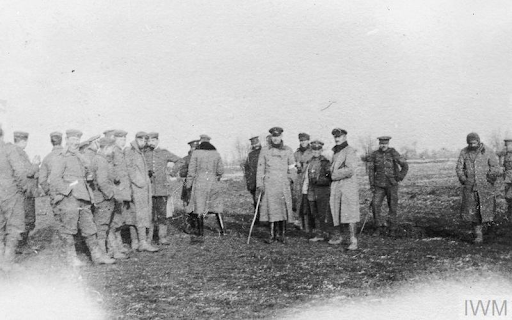Gunshots dwindle – Christmas carols and the smell of chocolate and cigars fill the air. It’s time for some fresh air and a break from the horrors of war.
The Great War was anything but pretty – but it was still in its early stages by the time Christmas 1914 rolled around. Men lived in hideous conditions, though, in hindsight, they are considered the lucky ones, having not witnessed the horrors of mustard gas or the tank just yet. The naivety of these soldiers certainly played a huge role in why the Christmas Truce happened in the first place, and why it never happened again.
Morale on the German side was soaring. Their advance on Belgium and France had been somewhat successful, and even though the conflict was morphing into a defensive war, it was one Germany could afford. The Triple Entente (Britain, France, Russia) could not, and it was assumed by the Germans that Britain and France would surrender soon enough.
So what triggered the Christmas Truce?
Things begin to unravel as carols fill the cold air of Christmas Eve. The German lines – intoxicated with pride and holiday spirit – recite the Austrian version of ‘Silent Night’. They put up fir trees lit with candles and open gifts sent to them from home. Morale is high. The British, witnessing this, put down their guns for the first time in the war and begin to parrot back their own carols and Christmas greetings.
Collin Wilson of the Grenadier Guards recalls the beginning of the truce: ‘We heard a German singing Holy Night of course in German, naturally. Then after he’d finished singing there were all sorts of Christmas greetings being shouted across no man’s land at us.’
Another account comes from British Private, Marmaduke Walkinton: ‘And we’d been shouting to each other, sometimes rude remarks more often just joking remarks. Anyway, eventually a German said, ‘Tomorrow you no shoot, we no shoot.’
The next day as the British poke their heads out of the trenches, they get no reaction. Instead, there are groups of German men inviting them into their trenches with waving arms. Both sides eventually agree to meet in the middle of No-Man’s Land. For a short time, they are friends; exchanging cigarettes, chocolates, plum pudding, and other items. In some sectors, games of football ensued. Both sides bury their dead and grieve as one. Men chat for the first time and realise they have more in common with these ‘enemies’ than the Senior Officers who commanded them.
An instance of this is when Captain Edward Hulse was presented with a Victoria Cross and some letters belonging to a late British officer. The man who had given them to him was Lieutenant Thomas of the 15th Westphalians, hoping that he could pass them onto the officer’s family. The two exchange winter clothing, and are remembered today for their displays of amiability towards each other.
This didn’t happen in all sectors of the war. It was more common among British and German soldiers, rather than the French and Belgian – who were partially under German occupation. In some places, the fighting went on even on Christmas day; the sounds of battle were still present as background noise where the unofficial armistices were held.
Senior Officers did not react well to the armistices. They knew that if the men began building personal connections with the enemy, it would spell the end of the war. After all, it’s harder to kill someone after you get to know them. Sir John French (who was the Commander-in-Chief of the British Army at the time) pulled some regiments involved in the truce from the front lines, and over the coming years, anyone who attempted to arrange similar armistices would be court-martialed.
This didn’t completely stop any truces from occurring the following year. As Private Robert Keating recounts in his diary in 1915, The German and British lines exchanged Christmas greetings and sang carols together for a second time. Interestingly, this was initiated by the Germans – just like the previous year.
Generally though, it was common to have brief pauses in the fighting to give both sides time to repair their trenches and to collect or bury the dead.
Inevitably, The Christmas Truce of 1914 came to a close. In some sectors, fighting began after an accidental shot was fired. In others, Officers met in No-Man’s Land one last time, fired two shots into the air, and went on with the war. Many who witnessed the first truce did not live to see the next Christmas.
The Christmas Truce will forever have its unique mark in history; a second of empathy in the hours of hatred. Although the events of Christmas 1914 have been slightly re-told and simplified, stories of the brave souls who wandered into No-Man’s Land will always be remembered and cherished for generations to come. For those men and for the shortest time, it was truly ‘peace on earth, goodwill to all mankind.’


